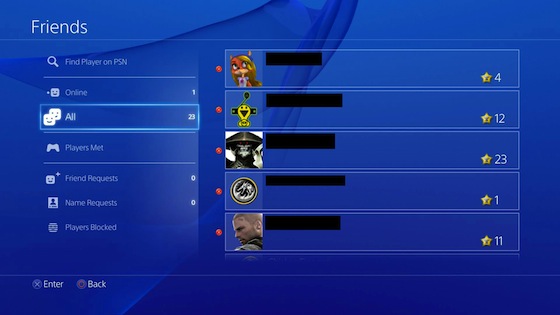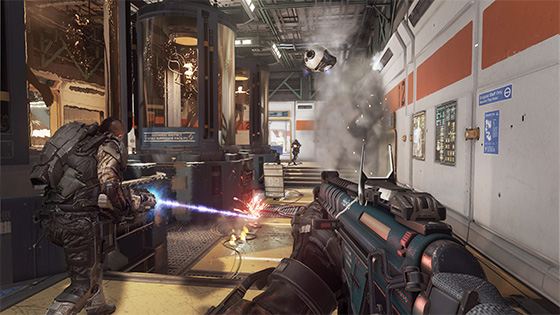Since the dawn of the information age, people have had the ability to communicate with people half a world away. While the information super highway has brought with it many benefits, this increased interconnectivity does occasionally have its downsides. Here are a few thoughts from two gamers (who incidentally live half a world away from each other), on why this invasive electronic advancement isn’t necessarily a good thing.
Georgie Catto:
To begin, a poem:
You can keep your DLC maps, your party line chats, your racist rants and WoW raid pants. No torrid trash talk, or microphone squawk – of pre-teens I’m totally free.
No friends overseas, or Aussies named Steve, no time zone tag or imperceptible lag – I game by myself, don’t need no one else, just pixels, just buttons and me.
Don’t have KDRs or covet your cars, and I don’t want to race, I set my own pace. When guilds give a call, I’m down the hall, asleep, as you probably should be.
If my connection is slow, only I know, if the server is down, I don’t have to frown. While you wait for your clave, I’ve got kingdoms to save, and damsels who must be set free.
I hack and I slash for my own bric-a-bracs – no ‘better loot’ niggles, no ‘pwn the n00b’ giggles – who needs them? I don’t, can’t you see?
When I switch on the console, I don’t care who’s there also, my friends list consists of just me. I spent time not in lobbies, but avoiding the trollies, by myself, on my own, c’est la vie.
Now, I know what you’re thinking: “I can’t believe she tried to rhyme console with also – it’s a completely different inflection!”
The main conclusion to be drawn is that I shouldn’t write poetry (incidentally, if anyone wants to post a poem in the comments, consider this an invitation), but I put it out there because it conveys what we’re talking about today; namely, that people suck and we’re all going to die alone.
Okay, that was a little dark. What we’re actually going to talk about is the reasons that some of us prefer to game by ourselves.

Friends list? No thanks.
I’ll admit, part of why I don’t play much with others is logistical. Very few of my friends are gamers, and even those that are don’t spend a whole heap of time mashing buttons. It’s a sad fact that as you get older, real life starts to happen. Jobs, kids, even mundane tasks like cleaning the bathroom (I really must get on that) eat into your spare time like a hungry dog eats chicken necks; quickly, completely and without any thought for the soup stock you were trying to make.
But surely I don’t have to rely on real world friends? The internet is nothing if not a place to meet like-minded people and discuss like-minded things. With nothing but a few button presses I could be playing with strangers, some of whom might even be decent human beings. I could, but I don’t, because human interaction is not why I game.
For me, gaming is something I do to get away from things, a place to escape from reality and not be yapped at by some kid who probably has homework to do. When I pick up that controller, I disappear into a different world, somewhere that the worries and concerns of real life can’t touch me; somewhere that feels safe.
For those brief hours I don’t want to be reminded of a reality outside of those precious few inches of screen. I want to be drawn into a place where I can be the hero that I’m not in real life, where I can see impossible sights and do impossible things. In those worlds, in those places, I can be anyone. And, more importantly, I don’t have to be me.
It’s an illusion that can easily collapse in the presence of another person, even if they’re only a silent shape offering silent assistance (or hindrance).
I get that it’s not that way for everyone. Part of the beauty of video games, or any media for that matter, is that they can mean different things to different people. For some it’s a way to connect with friends, or to satisfy those ‘my tribe’s better than your tribe’ urges, and I’m happy that technology has reached the point that all these views can be accommodated. But my question is this: why do I, as a largely solo gamer, have to put up with the constant echoes of multiplayer pushing into my not-as-long-as-I’d-like free time?

Why does Assassin’s Creed Unity force co-op missions down my throat, when I’m perfectly happy to play by myself? Why do the most prominent shooters have single player campaigns so embryonic that they haven’t yet grown tiny arms and legs? Why do I have to be always online with Destiny, even if I’m not interested in playing with anyone else? The PS4 has a share button. Why doesn’t it have a button dedicated to telling the world that I’m a sad, weird loser who’s quite happy going it alone? A special setting that would tell all my games that I’m not interested in having jackasses I don’t know (some of whom I’m sure are nice people) intruding on what I consider sacred me time.
Anyway, that’s me venting (an activity that makes me unique on the internet) and something I was quite happy to do by myself, until I talked to Jamaal and discovered: ‘holy crap, there are other people out there just like me’.
Jamaal Ryan:
The other day, one of our associate editors Adam Lloyd invited me to a co-op session in Far Cry 4. *Poof!* The devil on my left side had suddenly leaned into my ear, “Shit! This guy wants to play multiplayer with you?!” Then, *poof!* The angel on my right side rested his avuncular arm on my shoulder. “Just try it out Jamaal. Think about it as a team building activity! Set aside your avoidance towards co-op just this once.”
For a full five minutes, as I fumbled with the menu options, I was frantically brainstorming topics to talk about: “Hey, did you hear that Greg Miller and Collin Moriarty left IGN?!”, “Hey, I kinda hated Far Cry 3, what did you think?” – all were in efforts to overcompensate for my social awkwardness.
Once the Player 2 icon appeared on my HUD indicating that Adam joined my game, I greeted him with an overly confident, “Hello there!” And then… *Salutes*. Adam didn’t have a mic. His only means of communication were in-game prompts to acknowledge my existence and point me in the right direction. Though I was authentically disappointed I was not getting the chance to nerd out about games, part of me let out a sigh of relief. Adam and I were able to enjoy the game in silent exchanges of attack preferences, salutes, and middle fingers through Far Cry 4’s intuitive communication wheel.

While I’ll admit that my social anxiety is a “me problem”, I have reason to limit myself from many multiplayer experiences. Strangely enough, I thoroughly enjoy online gaming; however, I’ve always approached multiplayer with an incredibly limited set of preferences. I strictly pick between primitive, twitch-heavy competitive games, and simple, wave-based cooperative stand-offs. Neither requires a high level of coordination, something that I genuinely fear.
Take Battlefield. Battlefield is an exceptional game. The smorgasbord of squad options, a multitude of ground, water, and air-based vehicles, and the high level of focus on objective-based gameplay is a clan junkie’s dream. However, I’ve never found any enjoyment out of any form of dedicated communication. Like Georgie, most of my inner circle doesn’t play games to the degree that I do. I simply don’t have the opportunity to rely on my peers and know that they will have my back, not die constantly, and commit themselves to delicate roles… or even coordinate an actual game session in the first place. Even my attempts made towards engaging “randoes” have failed miserably where I’ve either been victimized for not aligning with their exact strategy, or became infuriated by their severe lack of competence.
Fortunately, games like Call of Duty alleviate many of these barriers. There are several reasons why Call of Duty is tremendously successful sales wise. But I’m convinced that one of the most overlooked means of its popularity is the pleasantly low bar for communication-driven team work. Call of Duty is a superb, pick-up-and-play multiplayer experience. One can jump in, lone-wolf themselves through a handful of mindless (albeit satisfying) wars of attrition, and jump back out without any level of social commitment. It’s the perfect pissing contest without having to stand next to one another along the wall of urinals.

But when looking at the metastasized trend of complex online-oriented games, it all kinda scares the shit out of me. Back at PAX East 2014, I got a chance to play Evolve, Turtle Rock’s upcoming asynchronous multiplayer shooter. When I sat down and played as the Goliath, I found it to be absolutely liberating. No teammates to rely on. No role dynamics to understand. Just me, my feast, and my four targets whose shit I was gonna fuck up.
And I did. It was a landslide, and that concerns me. I can’t imagine what it was like playing with three different strangers looking to each for the Trapper’s timing, the Support’s overwatch, or the Medic’s awareness. I can’t imagine how frustrating it was to attempt to collaborate on a strategy while a hulking, player-driven behemoth was barrelling down on them. It’s that wide margin of error that ‘if you don’t play your class, everything will go to hell’ that is very distressing to me, and that’s why I keep to myself.
Now I feel the need to reiterate this, but I love multiplayer. Even in its most disconnected state, it has a certain social element that hinges on our narcissism and low self-esteem to know that there’s that mother trucker you need to surpass, and others who don’t perform quite as well as you. “Speak for yourself, Jamaal.” Okay. I’ll take that. But the growing presence of multiplayer games that aren’t fun solo like Battlefield and Destiny makes me feel like I’m being left back in 2007, left for a more ‘party-chat’ connected, socially-driven multiplayer culture.
Oh, and Adam, forget what I said. I’d be more than happy to get that co-op trophy with you.

